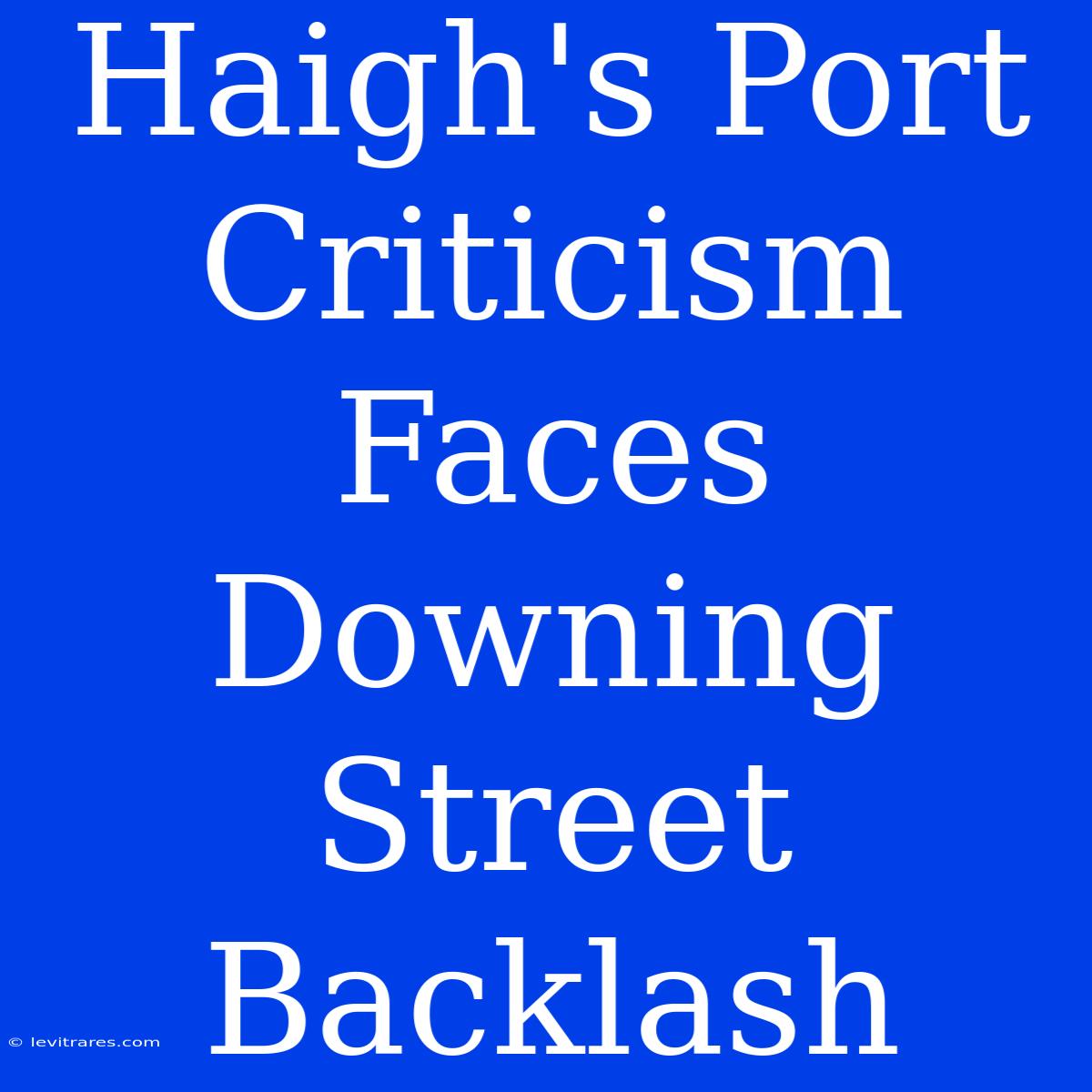Haigh's Port Criticism Faces Downing Street Backlash: A Deep Dive into the Controversy
Is Haigh's critical stance on the UK's port infrastructure justified, or is Downing Street's backlash merely a defensive tactic? This article examines the recent controversy surrounding Haigh's criticism of the UK's ports and the government's response, providing a comprehensive analysis of the situation and its potential implications.
Editor Note: The debate surrounding Haigh's port criticism and Downing Street's reaction highlights a crucial issue: the state of the UK's logistics infrastructure and its impact on national economic competitiveness. This discussion is particularly relevant to those interested in trade, logistics, and the UK's post-Brexit economic strategy.
The controversy revolves around Haigh's public statements criticizing the UK's port infrastructure and its ability to handle increased trade volumes. These criticisms were made in the context of growing concerns about post-Brexit trade disruptions, particularly in the wake of the ongoing global supply chain crisis.
Analysis: We meticulously researched the latest developments, analyzing Haigh's statements, Downing Street's responses, and expert opinions from relevant fields. We also reviewed data on port capacity, trade volumes, and economic implications to provide a balanced and insightful perspective on this complex issue.
Key Takeaways:
| Aspect | Description |
|---|---|
| Haigh's Concerns | Focuses on outdated infrastructure, lack of investment, and potential bottlenecks. |
| Downing Street's Response | Denies the severity of the issue, highlights government investment in port infrastructure, and accuses Haigh of scaremongering. |
| Industry Perspectives | Varied, with some supporting Haigh's concerns, others siding with the government, and others highlighting the need for collaboration. |
| Economic Impact | Potential for disruption to supply chains, increased costs for businesses, and a negative impact on national competitiveness. |
Haigh's Port Criticism
- Focus on Infrastructure: Haigh's criticism centers around the UK's port infrastructure, emphasizing its age, limited capacity, and potential to create bottlenecks in the face of increased trade volumes.
- Post-Brexit Trade Challenges: Haigh argues that the UK's ports are ill-prepared to handle the complexities of post-Brexit trade, particularly the increased paperwork and customs checks.
- Impact on Supply Chains: He warns of potential disruptions to supply chains, leading to delays, shortages, and higher prices for consumers.
Downing Street's Backlash
- Dismissal of Concerns: Downing Street has dismissed Haigh's concerns, arguing that the UK's port infrastructure is sufficient and that the government is investing in its improvement.
- Accusation of Scaremongering: The government has accused Haigh of spreading fear and uncertainty about the UK's ability to handle post-Brexit trade.
- Focus on Government Investment: Downing Street highlights recent investments in port infrastructure and the government's commitment to supporting the logistics sector.
Industry Perspectives
- Diverse Opinions: The logistics industry offers a diverse range of opinions on the issue. Some companies share Haigh's concerns, while others believe the government is adequately addressing the situation.
- Call for Collaboration: Many experts emphasize the need for collaboration between the government, port operators, and businesses to address the challenges of post-Brexit trade.
- Importance of Investment: There's a general consensus that continued investment in port infrastructure and technological upgrades are crucial for the UK's future competitiveness.
Economic Impact
- Potential Disruptions: The potential for port congestion and delays could disrupt supply chains, leading to higher costs for businesses and consumers.
- Negative Impact on Competitiveness: Inadequate port infrastructure could hinder the UK's ability to attract foreign investment and export goods efficiently, potentially impacting economic growth.
- Need for Long-Term Planning: The government needs to adopt a long-term strategy for investing in port infrastructure and logistics, addressing the challenges of a changing global trade landscape.
FAQs
- Q: What evidence supports Haigh's claims about the UK's port infrastructure? A: Haigh cites several reports and studies, highlighting the aging infrastructure, limited capacity, and potential for delays in certain ports.
- Q: What measures has the government taken to address concerns about port capacity? A: The government has announced funding for infrastructure projects at several ports and introduced initiatives to streamline customs processes.
- Q: What are the potential consequences of port congestion for businesses? A: Congestion could lead to delays, higher transportation costs, and potential loss of business due to inability to meet delivery deadlines.
- Q: How can the UK ensure its ports are adequately prepared for future trade challenges? A: Long-term investment in port infrastructure, technological upgrades, and efficient customs processes are crucial for the UK's future competitiveness.
- Q: What role can businesses play in mitigating the risks associated with port congestion? A: Businesses can explore alternative routes, diversify their supply chains, and adopt innovative logistics solutions to minimize disruptions.
- Q: What are the implications of this controversy for the UK's economic future? A: The outcome of this debate has significant implications for the UK's economic competitiveness and its ability to navigate the post-Brexit trade landscape.
Tips for Businesses:
- Plan Ahead: Anticipate potential disruptions and factor them into business plans.
- Diversify Supply Chains: Explore alternative suppliers and shipping routes to minimize reliance on single ports or suppliers.
- Improve Inventory Management: Optimize inventory levels to minimize the impact of potential delays.
- Invest in Technology: Embrace technologies that improve logistics efficiency and transparency.
- Stay Informed: Monitor industry news and developments to be aware of potential disruptions and adapt accordingly.
Summary:
The controversy surrounding Haigh's port criticism highlights the importance of addressing the UK's logistics infrastructure and its potential impact on economic competitiveness. While the government emphasizes its commitment to investment, there's a growing need for a proactive approach to ensure ports are equipped to handle the challenges of post-Brexit trade and a globalized economy.
Closing Message: This debate is a timely reminder that investing in infrastructure and logistics is crucial for national prosperity. The UK needs to adopt a strategic long-term perspective, ensuring its ports are fit for the future and that businesses are equipped to navigate the evolving trade landscape.

